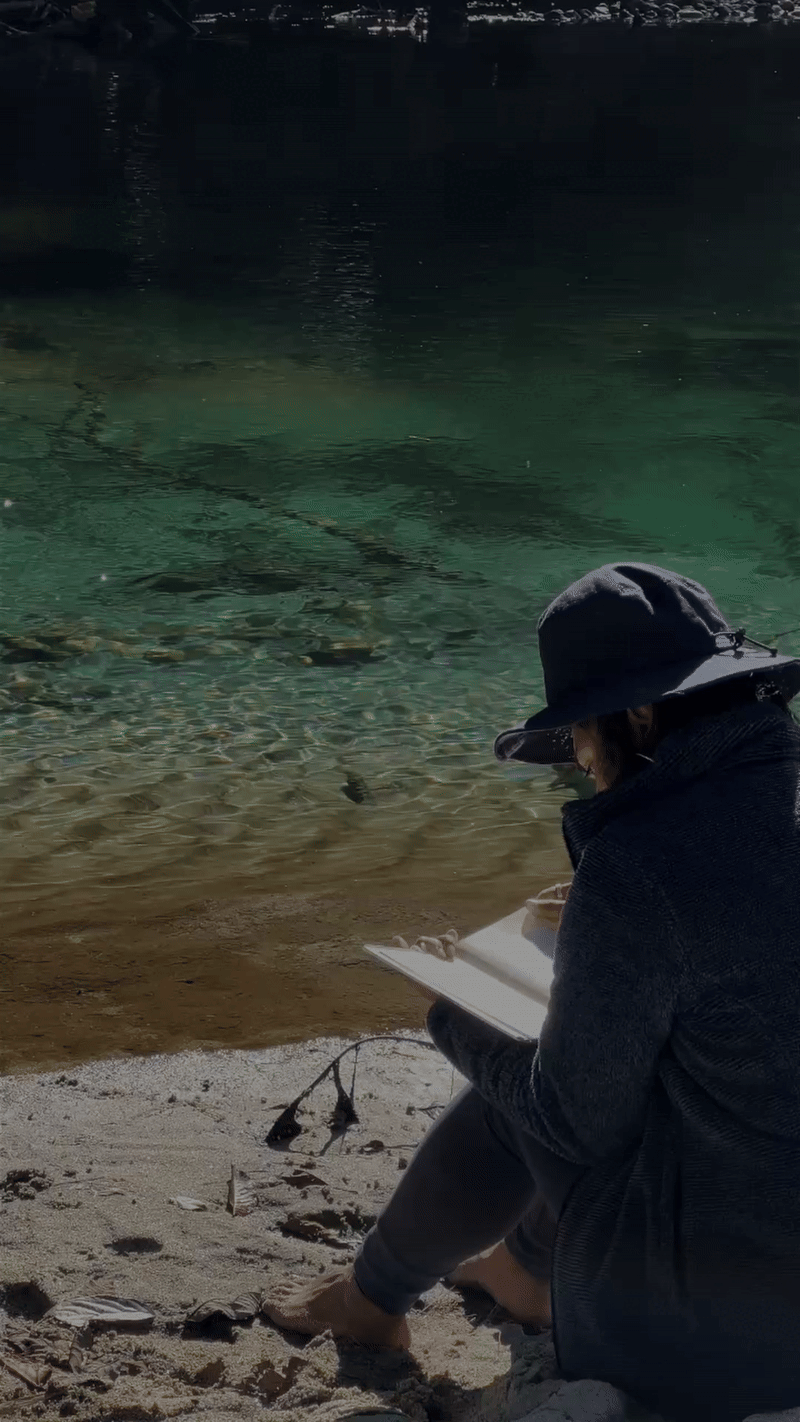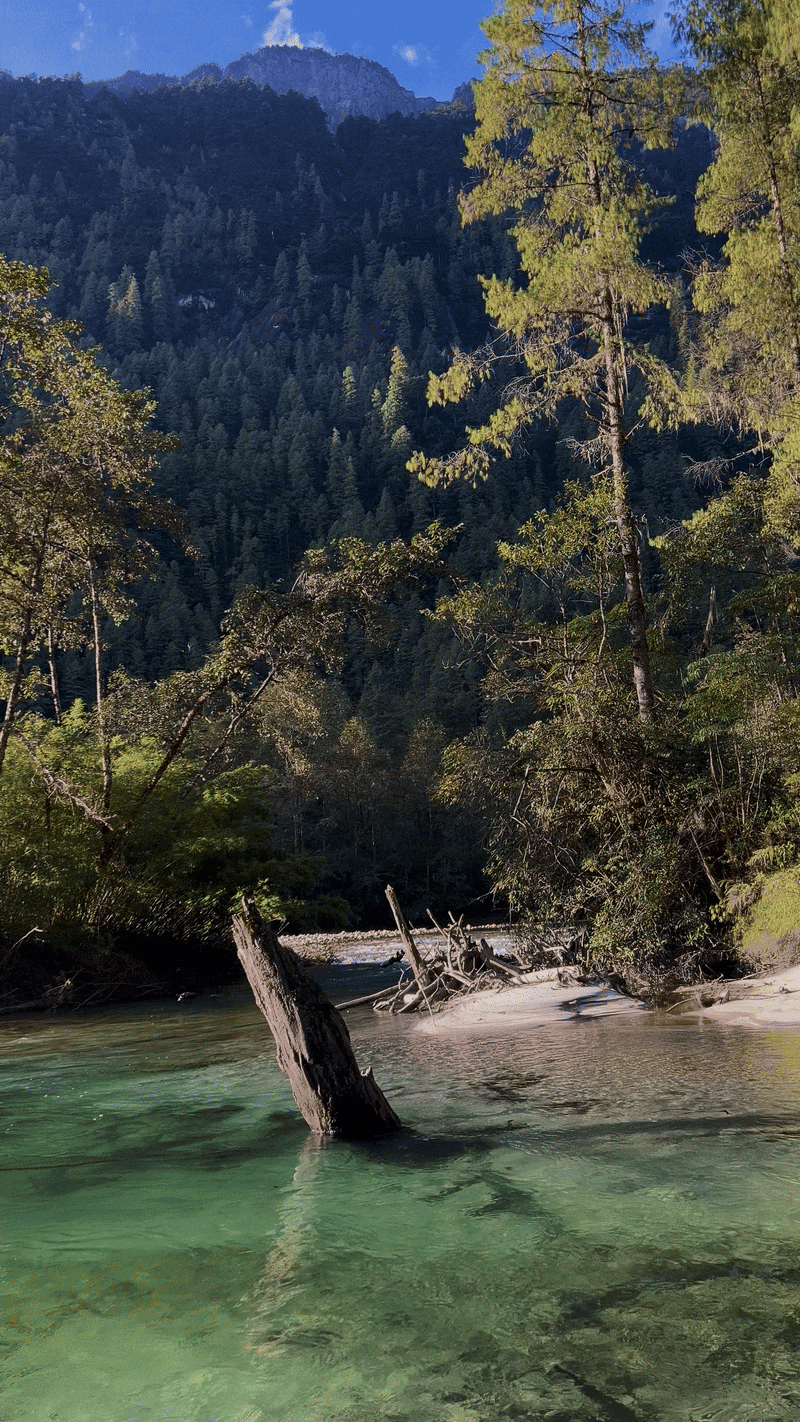

.png)
A gentle plan that doesn't crowd your personal space

CORE
EXPERIENCES
Experiences that stay with you long after you leave.

STAYS & FOOD
Locally owned/managed Maximum capacity: 4-5 Persons Sleeping Arrangements: Gendered. Clean & Hygienic. Shared rooms with Single Beds. Washroom: Clean & Hygienic. Shared. Non-attached. Indian Style (village) & Western (town & campsite) Food: Organic, Home-cooked Idu Mishmi food and local beverages + Indian Meals. Vegan, Veg & Non-Veg friendly. Perks: Hot water, Fireplace, Farm & Mountain/River Views.

A BRIEF OVERVIEW
Day 1: Arrival at DIB Airport latest by 2:30 PM + 3 Hours drive to Lower Dibang.
Day 2: 8 Hours drive to Dibang Valley
Day 3: 10 KM Forest trek
Day 4: Village Life
Day 5: River Exploration & Barbecue
Day 6: Waterfall hike(s)
Day 7: DIY day
Day 8: 8 Hours drive to Lower Dibang
Day 9: 3 Hours Drive to DIB + post 11 am departure from DIB.

DATES & COST
Waiting List | Filling Fast | Slots Available
9 Days & 8 Nights
4-5 carefully selected travellers.
Limited spots. Because experiences this raw aren't meant to be mass-produced.
JAN & FEB
(Winter Break)
MAR 28 - APR 5**
APR 11-19**
MAY 23-31**
JUNE 20-28**
JULY & AUG (Monsoon Break)
SEP 19-27**
OCT 17-25**
NOV 7-15**
NOV 21-29**
DEC 12-20**
DEC 19-27**
INR 58,000/Person + 5% GST
+ Air/Rail
Flexible Payment options available.
*Assisted by Shreyas Danappa
**Led by Amishi Mihu (Local, woman-led)
Kindly Note: Our journeys are mainly for solo travellers but we also welcome couples and friend duos who fit the group dynamic. Each person, whether traveling solo or with a companion, must register individually.
We regret that we're unable to accommodate families, children, and private groups of three or more.

ADD-ON
EXPERIENCES
INCLUSIONS
1) All Meals & Accommodation for the scheduled 9D/8N Program. 2) A private Scorpio or similar (with driver) available to use at your disposal (Includes transfer from/to DIB Airport) 3) An experienced team of resourceful local guides (trekking, camping, handicraft, village excursions, rafting etc.) 4) Certified Rafting Instructor(s) 5) A Trip Leader (Either Shreyas or an experienced local) 6) A local handicraft souvenir. 7) Costs associated with Barbecue & local brew such as firewood, ingredients etc. 8) Tents, mattresses & blankets for camping. 9) Basic Medical/First Aid Kit during the trip. 10) Indian Permits and Permit Fees
EXCLUSIONS
1) Airfare, Rail fare, Bus fare etc. 2) Any food and beverage costs apart from the ones mentioned in itinerary. 3) Optional Add-on Experiences. Add-on experiences are subject to availability. (We recommend pre booking add-ons if the uncertainty makes you uncomfortable). 4) Trip extensions, Buffer Days etc. 6) Foreigner Permits and Permit Fees (The permits may cost USD 50 for foreign passport holders). 7) Any Tips (Our local guides are paid generously. However, we are completely on board if you feel the need to tip them. We do not however encourage paying money to children or buying them chocolates and other packed foods.) 8) Tiffin box, water bottle & spoon for packed lunch. (Kindly bring your own as we want to minimise single-use plastic as much as possible.) 9) Costs arising out of unforeseen circumstances such as bad weather, road blocks, landslides, road conditions, political unrest and any other circumstances beyond our control. Note: The Eastern Himalayas are not known for great roads and there have been instances of road blocks before. 10) Travel Insurance 11) Any personal Expenditure (Shopping, medicines etc) 12) Any items / services not specifically mentioned under the head ‘inclusions’.
TRAVEL
IDEOLOGY


This journey is slow on purpose...
It's not about ticking off places or chasing bucket lists. It's about spending time in a few spots, slowing down, and really getting to know Arunachal’s wild mountain landscape and the people that call it home - at a leisurely pace.
...& deeply personal.
This journey isn’t a commercial tour package. It’s a personal effort to support my Idu Mishmi friends in preserving their land and culture against mass tourism and rapid unsustainable development.

MANDATORY CHECKLIST
(My Recommendations):
-
Your own toothbrush, toothpaste, shampoo and soap to minimise buying single-use plastic in the valley.
-
Protein Bars (optional)
-
Toilet paper (Eco-friendly)
-
Water bottle (Should not be single-use plastic)
-
Water purification tablets and/or potable water filter (for Spring/Monsoon dates only)
-
A fully charged torch or headlamp.
-
3-4 pairs of Comfortable breathable clothes for sunny days: 3-4 cotton T-shirts, 1-2 Trousers & 3-4 pairs of Breathable cotton socks etc.
-
A pair or two of quick dry arm-sleeves.
-
2-3 pairs of Warm Insulating Clothes for winters (temperatures can go as low as -5 during winters) - Thermals, An insulating jacket, Merino wool cap & muffler/bandana, ,Thick Woolen socks and gloves) for cold nights.
-
Insect repellant cream (Odomos etc) and bug spray against local black flies and mosquitoes.
-
Water resistant trekking trousers are recommended. We do NOT allow denim jeans.
-
A rucksack (preferably with waterproof covering). We do NOT allow suitcases, duffle bags, carry bags or trolley bags as they do not work in mountainous terrains.
-
Rain jacket + waterproof/resistant trousers.
-
A poncho (if you don't have water-resistant jacket or waterproof cover for your rucksack or to use as a mat on wet surfaces)
-
A bath towel
-
Trekking shoes
-
Rubber Boots or Gum Boots in case of rain forecast (They can be bought locally in Dibang itself for INR500/Pair)
-
Two new or used pairs of insoles to place inside your gum boots for padding.
-
A pair of sports shoes to wear casually.
-
A trekking pole (not mandatory)
-
A hat/cap to protect against the sun.
-
Your medications (allergies/motion sickness/infections or any other personal medications).
-
Appropriate swimming clothes.
-
A pair of slippers.
-
2 big plastic bags - one for storing soiled clothes and the other for any single use plastic generated or found during the program (Single use plastic cannot be disposed in the mountains. Needs to be carried back with you to the plains)
-
A tupperware lunch box and spoon (for packed lunch)
-
Sunscreen
-
A small waterproof daypack for hiking. Daypacks that are not waterproof can be protected by your poncho.
-
Hand sanitiser spray bottle (to use against leeches)
-
Original ID (Indian Passport or Aadhar or Voter ID) & 4 printed photocopies
-
4 printed photocopies of your Arunachal Permits (We will send you a soft copy to print).
Optional Slow Travel checklist
(My Recommendations):
-
A note book for journaling your thoughts & experiences, noting down words from the local dialect, and writing down local recipes.
-
Illustration tools to make paintings, postcards etc. (paints, brushes, pens, paper/canvas etc)
-
Binoculars and "Birds of Bhutan and the Eastern Himalayas" book
-
The Merlin Bird ID & PlantNet Apps
-
A ukulele or guitar
-
Marshmallows to roast.
-
A yoga mat
-
Any books of your own.
-
A hammock to do nothing on.
FAQ
How big will the group be?
The group will have a maximum of 4-5 carefully selected, like-minded participants. Quality over quantity, always.
Are foreigners allowed to participate in 'Into The Dibang'?
Yes, foreigners can join the program. However, since Arunachal is close to the China (Tibet) border, a Protected Area Permit (PAP) is required. This must be arranged in the state capital. Last we checked, it cost around USD 50 per person. We can help arrange them.
How is 'Meandering' different from 'Drifting'?
-
Drifting and Meandering take place in two entirely different locations.
-
Drifting is a nature-focused, outdoor itinerary designed for the summer and retreating monsoon season. It’s the rawer of the two - think foraging, fishing, outdoor cooking, hiking, birding and camping on most nights. It's more flexible and DIY-ish, guided by a loose outline rather than a fixed plan.
-
Meandering, by contrast, is a bit more polished and curated. It blends nature and culture, with experiences like village stays, hiking, rafting, camping, and some culturally immersive activities. The itinerary is more structured than Drifting, though it still leaves room for spontaneity.
Why are these journeys more expensive than the average tour packages ?
-
Our personally curated/vetted journeys offer more unique experiences than the average travel company (hand-picked team of locals, workshops, intimate cultural immersions, hidden gems and exclusivity etc)
-
Remote, Offbeat destinations (especially Northeast India) are pricier due to poor connectivity, higher cost of goods etc. You are going to be in remote locations that are not fully developed for mainstream tourism.
-
The group size is small (4-5 only) which increases each individual's overhead costs such as guides’ fees, transportation, activity costs etc.
-
We are very selective about who you travel with. Many applications are declined to ensure likemindedness among your travel companions. Quality is put before business needs.
-
Our local hosts and guides are paid generously + we don't feel comfortable bargaining or asking discounts. Owing to all this, the costs might seem a bit high at first glance, but they are totally worth it. (Check Testimonials on Instagram)
What kind of fitness levels are expected in these journeys?
The day treks are short but require decent amount of endurance and fitness. Nothing out of the ordinary.
I want to extend my journey and visit other places not part of the itinerary. Can you help me plan my extended journey?
Yes! We have a growing local network and will be happy to connect you with the right people and plan your extended journey.
What do I need to Bring with me on this journey?
Here's a list of things that will help you out :)
Is it safe (for women) to travel these locations?
YES. We have personally vetted these locations for general safety and our local team has been sensitised about women safety.
90% of our guests are women.
DISCLAIMER
This journey is for you if you’re fascinated by culture and thirsty for adventure. You’re flexible and don't mind the challenge of the unexpected. You aren’t intimidated by bumpy roads or Indian toilets or no electricity. Landscapes thrill you and cultures intrigue you. Meeting locals, blending in and getting a feel for a place is more important than getting a perfect Instagram shot and ticking a million bucket list items. You appreciate the freedom to explore independently without relying on hand-holding from us. You are comfortable with exploring at a relaxed pace and not covering all places.
This journey may NOT be the best choice for you if you prioritise the luxury and comforts of home while traveling, or want to cover too many places, or if you have specific high maintenance needs. Wifi, mobile data, hot water, and electricity aren't always available. You may have to use Indian toilets every once in a while, including where we stay. Local foods comprise the majority of our diets unless you have restrictions. Accommodations in remote areas can be basic or rustic at best. There will be no private, hotel-like rooms.
_edited.png)






